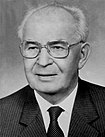Portal:Communism/Selected biography/30
Gustáv Husák (Czech pronunciation: [ˈgustau̯ ˈɦusaːk]; 10 January 1913 – 18 November 1991) was a Slovak politician, president of Czechoslovakia and a long-term Communist leader of Czechoslovakia and of the Communist Party of Czechoslovakia (1969–1987). His rule is known as the period of the so-called "Normalization" after the Prague Spring.
Gustáv Husák was born as a son of an unemployed worker in Pozsonyhidegkút, Kingdom of Hungary, Austria-Hungary (now part of Bratislava, Slovakia as Dúbravka). He joined the Communist Youth Union at the age of sixteen while studying at the grammar school in Bratislava. In 1933, when he started his studies at the Law Faculty of the Comenius University in Bratislava, he joined the Communist Party of Czechoslovakia (KSČ) which was banned from 1938 to 1945. During World War II he was periodically jailed by the Jozef Tiso government for illegal Communist activities, and he was one of the leaders of the 1944 Slovak National Uprising against Nazi Germany and Tiso. Husák was a member of the Presidium of the Slovak National Council from 1 September to 5 September 1944.

